ANALYSIS/OPINION:
You know I can’t resist saying something about D.C. Mayor Muriel Bowser’s inaugural spending plan that she released Thursday, but first I want to wax on about the fact that Passover, Easter and the anniversary of the King assassination converge this weekend.
Those religious days and the death of King share a history with a church in the nation’s capital that was the home to what now is viewed as a momentous Judeo-Christian moment, an event that reminds us that freedom isn’t free.
In 1968, the Rev. Martin Luther King had planned to partake in the Passover Seder with Rabbi Abraham Joshua Heschel, a prominent theologian, and his family. Rabbi Heschel had marched alongside King in Selma, Alabama, in 1965 and later that year presented the Baptist minister with the Judaism and World Peace Award.
But King was slain about week before the Seder, on April 4, 1968.
By the following spring, plans were in motion for another Seder. This particular moment was Passover at the Lincoln Congregational Temple United Church of Christ, the oldest black congregational church in the city. The congregation was long active in civil and human rights.
The church sits at 11th and R streets NW in the Shaw neighborhood, whose southern end merges with what today is the upscale Logan Circle area. Today and back in 1969, when this particular event was held, Shaw — like Logan Circle, LeDroit Park and other adjacent neighborhoods — was a notable bastion of black residents, many of them professors and teachers at Howard University.
The event was the Freedom Seder, and the participants included the Rev. Channing Phillips, a civil rights activist who ran Robert Kennedy’s 1968 D.C. presidential campaign, and Rabbi Arthur Waskow, a social activist. Hundreds of other religious figures and attendees gathered in the basement of Lincoln Temple, whose simple beginnings included dispensing social care after the Civil War.
And yes, the “Lincoln” in the church’s name is that of the president, who is credited with “freeing” the slaves.
Speaking of Lincoln
Muriel Bowser stood on the stage of the Lincoln Theatre on Tuesday night and laid out a broad proposal for her first budget.
Well, on Thursday, the mayor delivered some details in her $13 billion spending plan.
Average schmoes: Whether you live in, commute to or simply visit D.C., you can expect to cough up more money to park. Ms. Bowser has proposed raising the parking tax to 22 percent.
The parking tax was increased from 12 percent to 18 percent just three years ago.
“And then we raised the minimum wage, which are a lot of the parking attendants. If you’re in the parking business, this will be a triple whammy,” said D.C. Council member Jack Evans, who chairs the finance committee.
• Metrobus and rail users do not know yet whether fares and fees are on the rise, but D.C. residents are going to have to dish anyway. The mayor wants to increase the amount of money the city pays for its Metro subsidy — $29.5 million more than last year. The boost is to help cover free rides for school kids and young adults.
• Fire and EMS has problems. Everybody knows. But this also is a new budget for a new fire chief and a new mayor, and Ms. Bowser said she needs an estimated $81 million for new fire stuff. Really?
• Police get raises, and the mayor is asking for an extra $25.1 million to cover those raises.
Other increases in taxes and fees? The streetcar project? Housing? Small business? I cannot do them justice in my allotted print real estate.
Do keep an eye peeled this way.
Happy Easter!
• Deborah Simmons can be reached at dsimmons@washingtontimes.com.
• Deborah Simmons can be reached at dsimmons@washingtontimes.com.




Please read our comment policy before commenting.